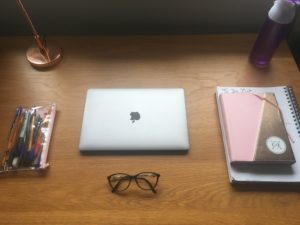Hi, my name is Isla and I am currently studying for my BA English degree at Exeter University. With the current pandemic and studies disrupted, tackling that pile of coursework you’d rather avoid, combined with health concerns and a distracting home environment is daunting. It’s easy to say ‘I just study better in the library’ but there are methods and tools out there to help you create the best study space you can at home.
Managing my studies around a busy timetable (I am part of three society committees, a subject representative and have a job alongside my studies) has encouraged me to find any resources I can to help with working at home productively and efficiently. I’m going to share with you some of the tools and study methods I use to keep up with work and still have time for Netflix and a social life (well more of a Zoom/Facetime life now).
My 3 most important general tips are:
- These tips will only be as effective as you are in implementing them… yes that means no repeated adventures to the fridge or YouTube rabbit holes mid essay…though we have all done it.
- Have fair expectations of yourself – do not set unrealistic targets and then punish yourself for not meeting them, but also avoid making excuses for unnecessary lazy days.
- Learn from your study mistakes – it is ok to make changes and find what works for you.
Creating the right environment and headspace
- Try to get up and go to bed at a similar time every day. I know you’ve heard it before but stick at it – a new routine takes a week to feel natural.
- Change out of your pyjamas. Comfy clothes I fully support, but no-one works well in the pyjamas that they would rather take a nap in.
- Don’t go straight from sleep to study. Give yourself some time to make breakfast, read or watch a little bit of a show you like, go for a walk or do some stretches. It is important to remember you would normally have a commute to university campus or school between waking up and studying, so give yourself some time to wake up properly and be in the right mindset.
- Choose a dedicated study space that is NOT your bed and stick to it. Working in bed has been proven to affect your sleep patterns negatively.
- Use your phone for break times only and turn off your social media notifications on your computer. Apps such as flora can be helpful to prevent you from constantly checking your phone.
- Designate and inform people of your ‘study hours’. Friends will be less likely to call and distract you, and you’ll be more aware of leaving your study session to message people.
- Keep up to date but try not to let news sources impact your state of mind negatively. The Togetherness Campaign by RMY is a great source of accurate news updates but put in quick to read Facebook posts.
- Either Study properly or Relax properly. Giving yourself time to wind down is important and it is better to study well for 6 hours and then relax for 3, than do 9 hours of inefficient and stressful work.

Organisational advice
- Write down clear weekly goals and then divide these by day. This makes tracking goals and progress a lot simpler so you can adjust your workload if your plans change, while still finishing on time.
- Organise your ‘to do’s by deadline and importance. Complete tasks in the order of due date NOT based on what feels easier. We tend to avoid work we’re stressed about, and productive procrastination is still procrastination.
- Use tools such as Trello and Todoist to track your tasks. A simple paper and pen to do list always works well too – I highlight mine with the top three urgent tasks to begin with.
- Keep your workspace TIDY. You don’t want to keep ‘cleaning your room’ or ‘organising your desk’ instead of getting your work done.
- Your lecturers/teachers are there to help – If you think you’re going to need help with an essay, ask sooner rather than later and lay out all your questions clearly in an email.
Study Tips
- Active studying – ask yourself questions on every topic before and after you study. (What do I already know? How does this information fit into the rest of my module/course? How could I plan an essay on this topic?)
- Always review and make note of difficult areas at the end of a study session – write reminders for areas you need to further research or recap.
- Get a good night’s sleep. Lack of sleep affects your body the same way alcohol does, and no-one works well hungover.
- Don’t skip eating proper meals, being hungry and constantly snacking are both unhealthy and distracting.
- Set timers for an hour every time you start a new task/topic and mark how long it took you to complete or how much was completed within 1 hour’s work. This helps with future time management and study planning as you understand your pace and workload better.
I hope some of these tips will help you but remember that different study methods work for different people and the current pandemic has thrown everyone a little off course. Don’t be too harsh on yourself, give yourself the best opportunity to do well by balancing work and relaxation time. You cannot pour from an empty cup.
